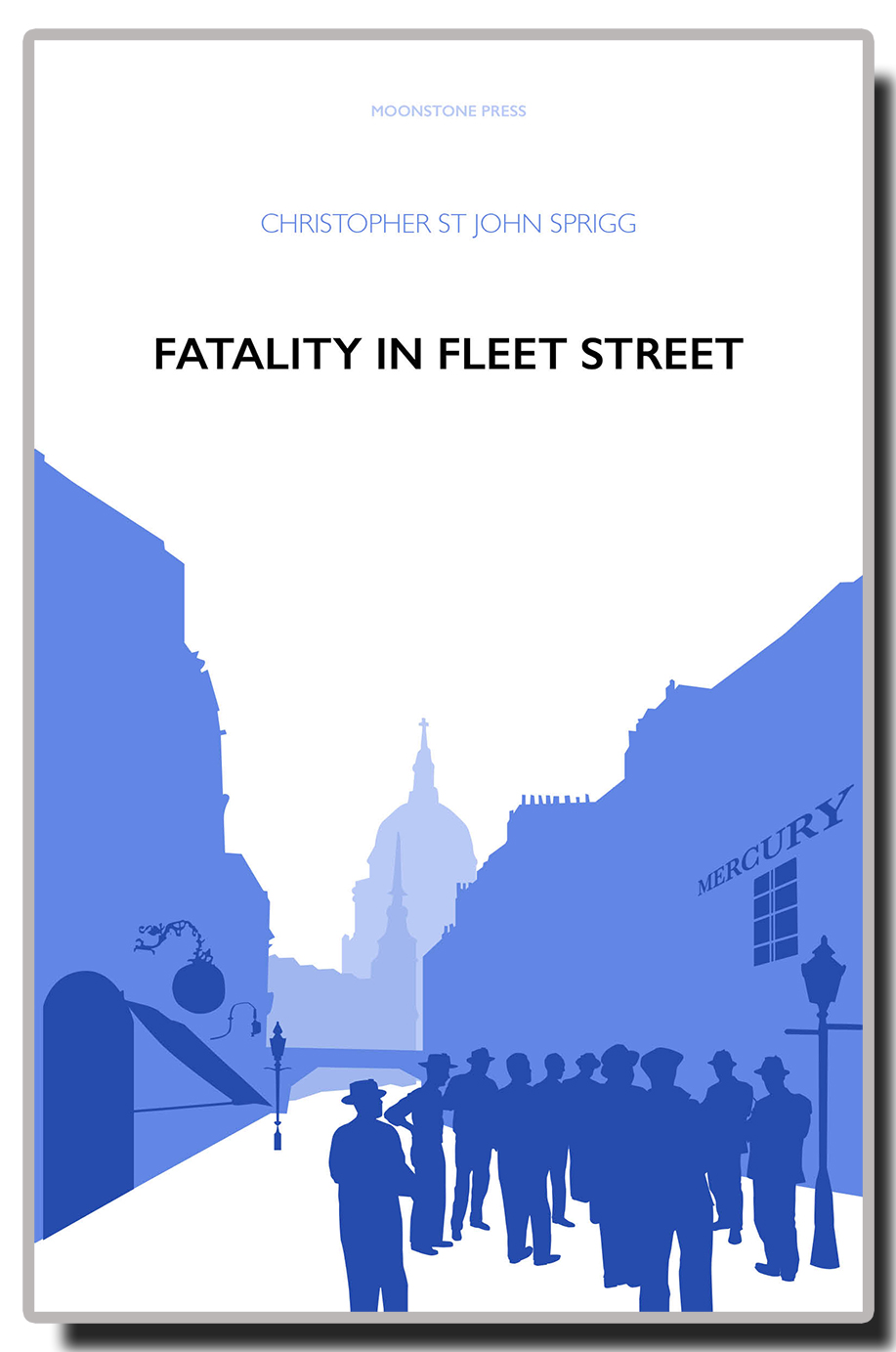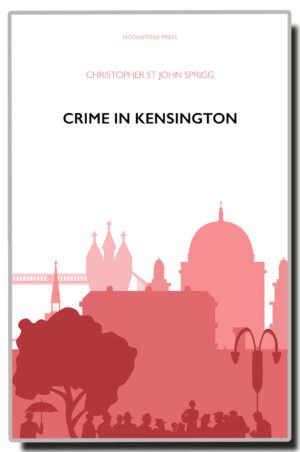Fatality in Fleet Street
“Three hundred years ago, Lord Carpenter, I’d have had your head on a spike on Tower Hill..”
It is 1938 and newspaper chief Lord Carpenter is about to publish a front-page story that will guarantee war with Russia. But before the paper can go to print, he is found stabbed in his office, and circumstances suggest the killer is one of his staff. Everyone from the editor-in-chief to the staff librarian had the opportunity. But was the motivation for the murder political or personal?
Crime reporter Charles Venables finds himself both suspect and sleuth as he tries to disentangle the clues and determine which of his colleagues is the guilty party. Red herrings abound, but it soon becomes apparent that more than one person had a reason to want Carpenter dead….
Fatality in Fleet Street displays the author’s trademark wit and a plot with plenty of twists and ingenuity to please the reader. Equally interesting are the political overtones and the militaristic pretensions of the deceased newspaper baron. The novel is set in 1938 – five years later than its real publication date – and presents a Russia whose economy is growing, which makes the country ‘a real menace to the established order of things’ in Carpenter’s worldview. Although the imperious newspaper baron meets his demise early on, his outsized personality and ambition are the bedrock that propels the story. Sprigg makes his satire clear; there is more than a passing resemblance between the fictional Lord Carpenter and the real world Max Aitken, Lord Beaverbrook, owner of the Evening Standard and Daily Express.
Sprigg started his career as a cub reporter and the book’s setting of a busy newspaper is well realised. Fatality also takes a sardonic view of socialist activity in Britain. When Venables goes to investigate a local chapter of the Communist Party, the situation is alternately threatening and farcical, with members parading their revolutionary credentials and loudly denouncing the ‘bourgeois’. Sprigg later became an active member of the Communist Party and published Marxist literary criticism, but his gently mocking tone in Fatality suggests this conversion was some way off in 1933.
£8.99
By Christopher St John Sprigg
Author of Death of an Airman
First published in 1933 by Eldon Press Ltd
Paperback
285pp
ISBN 978189900067
Interesting links:
The Rise and Fall of the Communist Party in UK
Lord Beaverbrook
Only logged in customers who have purchased this product may leave a review.
A Prime Minister Threatens
“Three hundred years ago, Lord Carpenter, I’d have had your head on a spike on Tower Hill,” said the Prime Minister, the Right Hon. Claude Sanger. Lord Carpenter made no answer beyond caressing his threatened neck reflectively.
“As it is I can only appeal to your better nature.” The Prime Minister’s voice faltered with the oratorical trick the wireless had made familiar to millions. Now, however, the trick was submerged in a note of genuine sincerity. “Do you realize what War means?”
Lord Carpenter, Governing Director of Affiliated Publications, the biggest newspaper group in the world, gazed thoughtfully out of the window. He saw London’s roofs tossing in a troubled sea below the lemon yellow and gilt heights of the Mercury’s gaudy building. He saw the sun glitter upon the transparent lattice-work of the Crystal Palace. But he was interested in none of these things. Force of habit made him turn his profile to his visitor, in order to exhibit his famous Napoleonesque profile with the wandering lock of hair on the high brow. Affiliated Publications’ 36,563,271 readers had often scanned it admiringly in photographic form. The Right Hon. Claude Sanger now scanned it anxiously for any sign of a chink in the other’s armour.
“I realize – better than you, perhaps, Sanger,” answered Carpenter.
“You do not realize – you cannot realize!” The Premier’s voice rolled thunderingly and his ragged features were a mask of tragedy.
“Think of the holocaust of young lives! The incessant jettisoning of our accumulated savings in the bottomless sea of destruction! Remember our widows! Our sucklings instructed in the lore of hate! Our nation’s veins drained of their vigour! Whatever hydra Russian Communism may be, it cannot justify this loosing of a ghastly scourge on England and the Empire. Carpenter, at this moment you are answerable to God and the innumerable posterity of our race!” “Your oratory is as admirable as ever,” answered Carpenter coldly. “I think, however, hard facts are all that matter at the moment. In the autumn of 1937, twelve months ago almost to a day, I decided that Russia must be crushed.” Lighting a cigar, Carpenter mentioned his decision with the same casual air as if it had been to have his house spring-cleaned. “The deciding factor was, of course, Russia’s first genuinely favourable trade balance with an unpegged exchange. That made her, for the first time, a real menace to the established order of things.” With the keen enjoyment of an enthusiast explaining his hobby, Carpenter produced a map from his desk. “I determined that this country, striking up through India, should be the executioner. The clash must come sooner or later, but obviously the time for it to come is when we are strong and Russia militarily negligible. I don’t propose to justify myself. I am perfectly happy in my own mind about the rightness of my aim. Therefore for the last twelve months the unique power of my papers – I think I can call it unique without boasting – has been devoted to the end I proposed—”
The Premier exploded. “By every device of dishonest propaganda! By the employment of the world’s carrion crows as agents provocateurs! By methods which are an outrage on the fair name of Journalism!”
Carpenter raised a deprecating hand. “By the very methods which, employed in the services of the Produce More British Goods Campaign, induced you to recommend me for a Viscounty. The methods, in any case, are beside the point. They have resulted in an upheaval of popular opinion which you have as much chance of controlling as of stopping the Flying Scotsman with one hand. The Empire is simmering. It needs only one more puff of flame to make it boil over.”
The Premier, arms folded, sagged slowly forward in his chair. He was a poor listener. He had reached his present position largely because he never bothered to grasp what his opponents were saying. The fact that his speeches contained no reference to their arguments gave the public the impression that they were not worth answering. This made him a tower of strength in debate, but it was a handicap in private life.
Carpenter smiled. “That puff of flame has come.” He stabbed Russia in Asia with one long forefinger. “Just around here, in an obscure Soviet, an incident has occurred which, handled as it will be handled by my papers, will bring the Empire to the boil. The Foreign Office knows nothing of it. Fleet Street knows nothing of it. But I know, and tomorrow the whole Empire will know, know of it in such a way that war will be inevitable. The Government that attempts to compromise, even your own Federated Progressive Government, will fall in a night.”
Sanger was silent. He rose heavily to his feet.
“Jove, the old boy looks old,” thought Jerningham, Carpenter’s confidential secretary, as he brought in the Premier’s hat and stick. The silence might have seemed profound with the fate of nations, but the words of farewell were formal. Yet at the door the Premier paused. “I am going back to decide whether to resign or to try to guide the ship through the coming storm,” he said wearily. “Probably I shall resign. I’m getting on now, you know. Meanwhile I must warn you that if I can think of any means, lawful or unlawful, to upset your plans, I should take them without a moment’s hesitation.”
And for a second the elder statesman looked like the red-headed young fighter of his pre-war political apprenticeship.
Carpenter laughed with unruffled good temper. “You see we are none of us pacifists when it comes to the pinch.”
II
“Take a note, Jerningham,” said Carpenter briskly, replacing the map in the desk.
Hands in pocket, the “Chief ” of the largest publishing organization in the world strode up and down the room. Suddenly he turned to Jerningham. “What the devil do you mean by wearing that foul tie in my office?” he barked, dragging the offending green object out of the opening of his secretary’s impeccable lounge suit. Raised in anger, his voice lost its veneer of refinement and became grating. “You’re nothing but a clerk. Remember it and dress like one, not like a Gaiety chorister.”
Jerningham flushed. His handsome but weak face twisted with an expression which might have been shame or fury. His hand shook as he replaced the tie. “I beg your pardon, sir,” he answered meekly. Carpenter resumed his pacing. At last he spoke, with the colour-less precision of a dictating machine.
“This is to be the main leader page article. It must run to four columns with a streamer headline. The first two paragraphs are to be in bold type. The article should be illustrated by a photo of myself, of Stalin – the most repulsive one in our files – and that photo of crowds lying down flat on their faces in a Moscow street during the Tsarist succession riots – only give it the caption ‘Religious procession mowed down by Bolshevist soldiers.’ We ’ve used it before, about a year ago. Now begin. ‘We must fight or go under! The Brezka Atrocity is the final move in the Bolshevist policy of encirclement stop The object of that policy is the obliteration of the Empire comma the only bulwark between Communism and Civilization stop’ That last sentence to be in small caps…”
He halted a moment and spoke down the dictograph. “Hubbard?
Bring up all we’ve got about the Brezka concession at once.”
Then in a monotonous voice he continued. The tone was dreary, but the article was one which, like all the Chief ’s writing, would go straight home to the bosom of the average man, of which Carpenter himself was a glorified enlargement.
“Rotten, Hubbard, rotten,” shouted Carpenter, glancing through the meagre file of cuttings brought to him by Hubbard. “Much more than this has appeared! You get more damned inefficient every day.” Hubbard gave a strangled cry of protest. The mildest of men, this was enough to stir him to bitterness. Jerningham felt a fellow feeling for him, smarting in his turn under the Chief ’s rough tongue. Jerningham knew Hubbard’s reputation on Fleet Street. A wizened, parchment-faced old man, he dwelt from year’s end to year’s end in the dusty library of the Mercury. He had never been known to take a holiday or be away ill. Some said he was expiating the terrible day when he gave a reporter, told to write up the obituary of a politician called Armstrong, the dossier of a novelist of the same name, whose obituary had accordingly appeared the next morning. Since that morning, it was credibly asserted, he had never been seen to smile again. His perpetual residence in the library was, however, of some value. The filing system he adopted for newspaper cuttings was so elaborate that it was believed no one but himself could grasp it. Imagination quavered at the prospect of his death. But the system was worked by him with astounding speed. He boasted that anything that had appeared about anything could be produced by him in two minutes.
Now, in his agitation, his shaking hand spilled snuff all over his jacket. He brushed his lapels and nervously tapped down the lid.
“Damn it,” roared the Chief, “I will not have that disgusting habit here. Jerningham, mop up that stuff from the floor!”
Blinking up at him, the librarian insisted on making his protest. “I am quite certain nothing has appeared which is not in that folder,” he asserted.
“Nonsense, nonsense,” said the other angrily. “I’ll have to get a filing expert in to teach you some lessons, or better still, boot you out altogether.”
Even Jerningham was staggered at this outrageous threat, but Hubbard said nothing. His beady eyes regarded the Chief coldly behind his pebble eyeglasses.
“All right,” Carpenter said at last, “you can go.”
The Chief did not go on with the dictation of his article immediately. Hubbard had gone. He stared ahead reflectively. “Extraordinary that such an unprepossessing fellow should have such a charming daughter,” he said reflectively. “When I first saw her in the Advertisement Canvassing Department and asked her name, I could hardly believe it. What a figure!”
Jerningham, kneeling on the floor wielding a duster, thanked his stars that at least he hadn’t a daughter working in the office of whom Carpenter spoke in that tone, and knowledge of Carpenter’s weakness was by no means confined to his secretary. Very unwise of Hubbard, thought Jerningham, for even he must know by this time how things stood between Carpenter and his daughter.
III
The thinkers of England’s thoughts sat round in the draughty Board Room at the top of the lemon yellow Mercury building which dominated Fleet Street.
In other words, there was a Special General Conference of the Mercury called by Lord Carpenter. The “General” in the title accounted for the wide assortment of people who were present, from the editor to the Publisher. The “Special” in the title accounted for the equally notable omissions in the ranks. On the whole, however, the band was sufficiently representative of the hard-working souls who formed the conversation and conscience of democratic England. At the moment they all looked a little uneasy, except Grovermuller, the editor. A dapper, silver-haired, bird-like little man immersed in a ponderous-looking review, he sat in the centre of the crescent of chairs. The hierarchy of the paper dwindled in orderly formation to the tips of the crescent, and at the extreme right hand tip was Charles Venables, late society editor, but now crime expert of the Mercury. There was a faint air of surprise even on his innocuous face as he toyed with his monocle, and seeing it his neighbour, Perry, the art editor, endeavoured to reassure him.
“It’s all right. This is a Gathering of the Good Boys.”
This mysterious phrase was not lost on Charles. The last gathering had been a Gathering of the Bad Boys – those members of the Advertising Staff whom Carpenter had considered responsible for a dwindling in the Mercury’s revenue. Carpenter, mottled with rage, had screamed invective for half an hour at his shaken staff. He had wound up by stating that Sergeant Capes, the commissionaire, was a better Advertisement Manager than any of them, and had installed the bewildered worthy in the Manager’s office at the Manager’s salary until such time as the revenue was restored to its old figure. Meanwhile, the Manager received Sergeant Capes’s salary. The Advertising Staff agreed to leave in a body that evening. The next morning calmer counsels prevailed, and the succeeding issue grossed a revenue five per cent above the average. That evening Sergeant Capes, gloriously drunk, was thrown out of the Savoy Grill Room, after sweeping Sir David Lowder, the famous advertising magnate, into an alcoholic embrace of kinship. On the second morning all was quiet.
But this was a Gathering of the Good Boys. Charles’s neighbour, Perry, for instance, was the only art editor in Fleet Street, in fact probably in the world, who made up the picture page in a morning- coat and spats, instead of the waistcoat and dusty trousers more usual to the tribe. Perry’s languid accent matched his appearance, both of which were deceptive. In his time, as a stripling press photographer, Perry had been towed by a submarine on an aquaplane in the North Sea, hung by his legs from an aeroplane undercarriage in mid-air, lain on his belly along the smoking-hot bonnet of a Grand Prix racer cornering at 90 m.p.h., all to obtain shots a little more distinctive than those of his competitors. And he had the knack of inspiring his cameramen to go and do likewise.
“What is the Chief ’s allocution going to be about?” asked Venables, feeling rather like a member of a Fourth Form summoned en masse before the Head. Even the nickname the “Chief ” was like a schoolboy tradition.
Through the ramifications of Affiliated Publications Limited, whose journals accounted for eighty-five per cent of the country’s circulations registered at the Audit Bureau, Carpenter now wielded a power in the newspaper world of imperial dimensions. But he still loved to remind Fleet Street in the mellow, paternal tones he had acquired with the passing years, that he was, after all, a “working journalist.” Nothing pleased him more than that his staff should visualize his active shirt-sleeved co-operation with them, such as was suggested by that nickname, the “Chief ”.
“Anything might happen, old boy,” admitted Perry. “The Chief may burst into tears and say he has remembered us all in his will. He did that last time. Or he may walk in as he did once, look round in dead silence, mutter, ‘Magnificent! Magnificent!’ and walk out again. We may all be given a rousing speech and told to look in our pay envelopes next week, and when we look, find the same as usual. That happened once, you know.”
This not being helpful, Charles endeavoured to find enlightenment by scanning the thirty-odd men – and women – decorating the office. They did not look at their ease – but it was not an office conducive to ease. Opposite the crescent of chairs was a full-length Orpen of the Chief. Round the walls were hung the remarkable collection of weapons gathered by the Chief in his wanderings. The furniture was massive – blackened oak, burgeoning and heaving with baroque carving. The carpet was inch-deep with pile. The Chief was just going through a period of craving for luxury – a reaction, perhaps, from the year before, when a longing for austerity had stripped his office of all superfluous furniture. The unfortunate results of this craving instantly depressed any visitor on entry to the room, even in the most auspicious circumstances.
In any case, being one of the Chief ’s Good Boys was, strangely enough, more depressing than to be a Bad one. He that is down need fear no fall. The whole staff of the Mercury, from the Advertisement Manager to the Messenger Boy, Art Perkins No. 25, were, as it were, distributed on two ladders, those on the right ascending in the Chief ’s favour, those on the left descending. Only the editor, Eric Grovermuller, by some uncanny gift, was able to remain perpetually at the top, teetering dangerously at times, but always recovering himself by his supreme talent for poise.
Now all of the staff gathered together in that office were near the top of the ladder. Venables had just sensationally solved the Garden Hotel Mystery. Perry had obtained an exclusive photo of the Macon’s forced descent on the South Pole by a brilliantly improvised organization of speed-boats, dog-sleighs and aeroplanes. And all being near the top of the ladder, all feared the inevitable approach of the return to the abyss.
“It is the Russian business, of course,” boomed out Andrews’ voice suddenly from Perry’s elbow. Andrews, enormous and shaggy, carried heartiness to an extreme which might have made the judicious suspicious. With reason – Andrews was the shrewdest City editor in England. More than one famous swindler, expounding his schemes with invincible assurance to this cheery soul, had suddenly felt deflated by a cruel thrust at the weak spot in his scheme, delivered with the utmost bonhomie. And the point was subsequently pressed in the City column with a persistence which was attributed to malice. Quite wrongly, because Andrews did not know what malice was.
“You, my lads,” he went on, “have the privilege of seeing how patriotism is manufactured, and war made. In twenty years’ time your memoirs will be history. Meanwhile, you will probably have been blown to bits, and, anyway, you will not be believed.”
“I suppose it’s rather a dirty job we’re doing,” mused Venables. “But a fascinating kind of dirt…”
“Here,” interrupted Perry, “is the Chief.”




Reviews
There are no reviews yet.